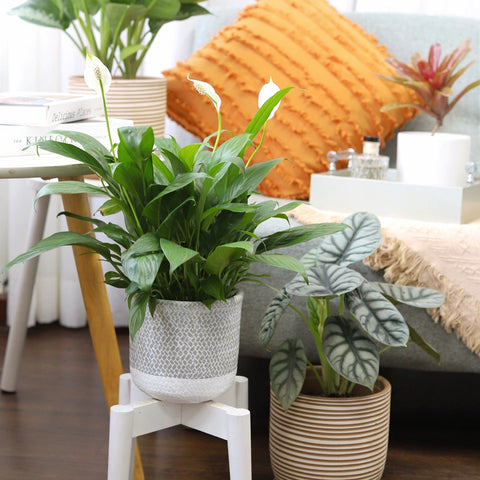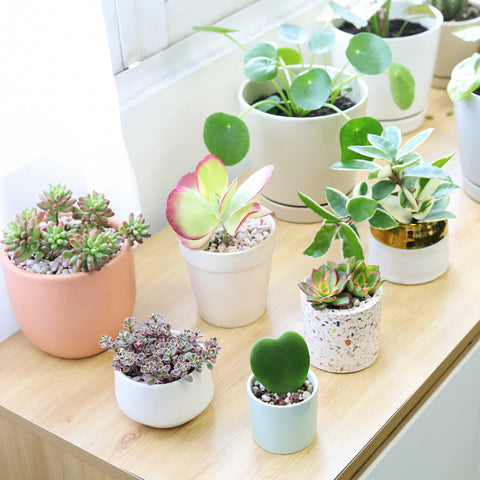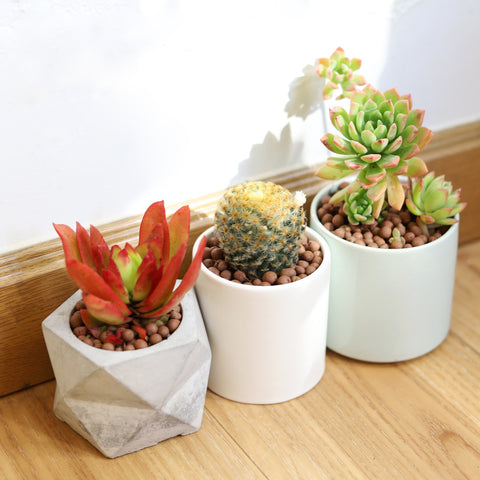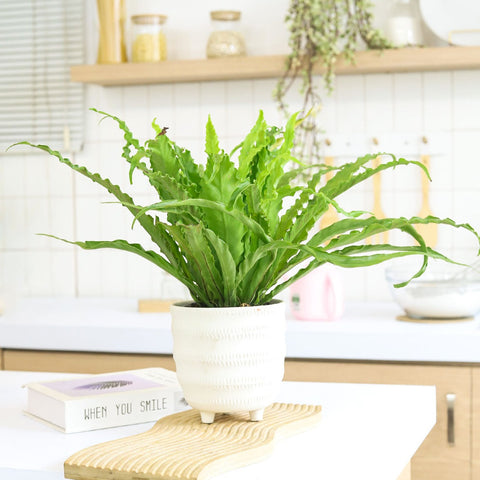In today's bustling world, where time is precious and living space tends to be compact, low-maintenance houseplants have become a part of modern essentials.
These sturdy green companions are gaining popularity, bringing a breath of fresh air to our compact living spaces. What makes them so appealing is their ability to bring the joy of indoor greenery without demanding rigorous care routines. They're the perfect solution for those of us navigating modern lifestyles, whether you're a busy person or just someone who prefers an easygoing approach to plant care.
Low-maintenance houseplants create a harmonious blend of nature and convenience, providing a simple and accessible way to achieve some greenery indoors without the stress of high-maintenance upkeep. Their versatility goes beyond resilience, as they thrive in environments with limited natural lighting, making them ideal for apartments or rooms with restricted sunlight. Low-maintenance houseplants allow us to enjoy nature without compromising our modern lifestyles.
What Are Low-Maintenance Houseplants?
Several factors contribute to making a houseplant low-maintenance. One crucial aspect is their watering needs, as these plants usually don't require frequent watering, which helps them tolerate periods of dry soil and reduces the risk of issues like root rot. Light tolerance is also vital, with low-maintenance plants thriving in various light conditions, especially indirect or lower light levels, making them adaptable to diverse indoor environments. Many low-maintenance houseplants can thrive in low-light conditions and in modern buildings with limited natural light. They thrive in most typical indoor conditions, which include dry air and indirect lighting. Moreover, resilience to environmental changes is one crucial characteristic of these plants. They can withstand fluctuations in temperature, humidity, and other factors without succumbing to stress-related issues.
Another adaptability of these houseplants is that they are not picky about soil types and can thrive in most standard potting mixes, minimizing the need for frequent soil amendments or specialized care. Pest resistance is one important factor that makes a houseplant easy-care. Some plants naturally repel pests or diseases and thus require less intervention in terms of pest control, promoting robust health.
Additionally, many low-maintenance houseplants are very easy to propagate. They can be effortlessly propagated through simple methods like stem cuttings or offsets. They have a forgiving nature, allowing them to bounce back from occasional neglect or irregular care. Many of these plants also act as air purifiers, contributing to improved indoor air quality. When selecting low-maintenance houseplants, it's essential to consider your specific living conditions, including available light, temperature, and your personal schedule for plant care.

Low maintenance houseplants are plants that are not picky about soil types, watering needs, and light requirements.
How To Choose A Low-Maintenance Houseplant For Your Living Space?
Selecting a low-maintenance houseplant for your living space requires thoughtful consideration of various factors to ensure a harmonious fit with your lifestyle and the conditions of your home.
- Assess Light Conditions: Evaluate the natural light available in your living space. Choose a houseplant that matches the lighting conditions.
- Evaluate Watering Needs: Be honest about your watering habits. If you tend to forget or have a busy schedule, opt for plants that can tolerate infrequent watering.
- Consider Humidity Levels: Take into account the humidity levels in your home. Some tropical plants prefer higher humidity, while others originating from arid regions may prefer drier conditions.
- Assess Available Space: Consider the available space in your home. Choose plants that fit the size of your living area and don't outgrow their containers quickly. Compact varieties or those with controlled growth are great for smaller spaces.
- Check for Pest Resistance: Low-maintenance plants are often resistant to pests. Research and select plants known for their resilience against common pests, reducing the need for extensive pest control measures.
- Research Growth Rate: If you prefer plants that don't require frequent repotting, choose slow-growing varieties. This minimizes the maintenance involved in managing their growth and size.
- Consider Aesthetic Preferences: While prioritizing practical considerations, also think about the aesthetics. Choose plants with foliage colors and shapes that align with your personal preferences and complement your home decor.
- Check for Toxicity: If you have pets or small children, be mindful of the toxicity of certain plants. Opt for non-toxic varieties to ensure the safety of your household.
- Assess Commitment Level: Consider your commitment to plant care. Even low-maintenance plants require some level of attention. Choose plants that align with the time you realistically have for their care.
Top 10 Low-Maintenance Houseplants for Busy People
1. ZZ Plant
The ZZ Plant (Zamioculcas zamiifolia) stands out as a top-tier choice for a low-maintenance houseplant, renowned for its resilience and adaptability. Originating from Eastern Africa, this plant thrives in low to moderate light conditions, making it an ideal addition to indoor spaces with limited natural light. Its striking appearance features glossy, dark green leaves that emerge from upright stems, creating an elegant and contemporary aesthetic. Known for its drought tolerance, the ZZ Plant prefers to dry out between waterings, making it forgiving of irregular care and a perfect fit for busy individuals. Beyond its visual appeal, the ZZ Plant contributes to indoor air quality by purifying the air. With a versatile nature that allows it to adapt to various room temperatures, the ZZ Plant is a hassle-free yet stylish choice for those seeking a touch of greenery in their living spaces.
2. Spider Plant
The Spider Plant (Chlorophytum comosum) is another wonderful choice among low-maintenance houseplants, cherished for its adaptability and air-purifying qualities. Native to Southern Africa, this resilient plant has become a favorite in households worldwide. Spider Plant is characterized by its arching, variegated leaves that resemble spider legs, creating a visually appealing and distinctive look. Its hardiness extends to different light conditions, thriving in both indirect and bright, indirect light. One of its standout features is its ability to produce "pups" or offshoots, making it easy to propagate and share with others. With minimal watering needs, the Spider Plant can tolerate periods of neglect and dry soil, making it an excellent choice for those with busy schedules. As an added bonus, this plant has been recognized for its air-purifying capabilities, effectively removing common indoor pollutants. Overall, the Spider Plant offers a delightful and low-maintenance green companion that can thrive in various environments.
3. Succulents
Succulents stand out as exceptional low-maintenance houseplants. Most succulents come from arid regions, and they have adapted to store water in their fleshy leaves, enabling them to endure extended periods without watering. Renowned for their resilience, succulents are well-suited for individuals with busy lifestyles or those prone to occasional forgetfulness. They can go for up to 2-3 weeks between watering sessions. Moreover, their ability to thrive in indirect light makes them versatile additions to various indoor settings. Succulents are also known for their ease of propagation; many can be grown from leaves or cuttings, providing an opportunity to expand your collection effortlessly. With minimal water requirements and the capacity to withstand neglect, succulents bring a touch of nature to any living space, requiring little effort to maintain while offering a wide range of shapes, colors, and textures for visual appeal. Some popular and easy-care succulent species include:
- Haworthia attenuata (Zebra Plant): Recognized by its striking zebra-like stripes, this succulent is adaptable to various light conditions and requires minimal watering.
- Echeverias: These rosette-shaped succulents come in various colors and are known for their hardiness and low water needs.
- Sedums:With numerous varieties, Sedums are hardy and can withstand neglect, making them suitable for low-maintenance gardening.
- Sempervivums (Hens and Chicks): These rosette-forming succulents are cold-hardy and resistant to pests, requiring minimal attention.
- Aeoniums: Aeoniums feature striking rosettes and are relatively undemanding, thriving in well-draining soil and bright light.

Succulent is the best choice for busy people.
4. Cacti
While cacti fall under the broader category of succulents, they boast distinctive characteristics that set them apart. Cacti are a specialized group of succulent plants known for their unique adaptations to arid environments. One defining feature is the presence of areoles—small, specialized structures from which spines, flowers, and new stems emerge. Unlike many other succulents, cacti are equipped with spines that serve various purposes, including protection from herbivores and reduction of water loss through transpiration. Cacti are native to the Americas, with diverse species found across North and South America.
Cacti are renowned for their resilience and ability to withstand neglect. They prefer bright, indirect light but can tolerate lower light levels, making them versatile for various indoor settings. One of the key reasons cacti are low-maintenance is their minimal water requirements. These plants store water in their stems, allowing them to endure dry periods without frequent watering. Overwatering is a common issue for many houseplants, but cacti thrive in well-draining soil and infrequent watering intervals.

Besides succulents, cacti is also a low maintenance plant for busy people to grow.
5. Pothos
Pothos, or Epipremnum aureum, is some of the most easy-care and low-maintenance houseplants. They are perfect even for beginners and people who are new to indoor gardening. Originating from the Solomon Islands, Pothos has become a popular indoor plant due to its adaptability and resilience. This trailing vine features heart-shaped leaves that come in various shades of green, making it an aesthetically pleasing addition to any living space.Known for its ability to thrive in low light conditions, Pothos is an excellent choice for homes with limited natural sunlight. It can tolerate occasional neglect, making it a perfect option for busy individuals or those new to plant care. Pothos is also versatile when it comes to watering; it can withstand periods of dry soil and doesn't require frequent watering. Moreover, it is effective in purifying indoor air by removing common pollutants. Its low-maintenance nature, coupled with its attractive appearance and air-purifying qualities, makes Pothos a fantastic addition to homes and offices alike. Whether placed in a hanging basket or on a shelf, Pothos adds a touch of greenery without demanding too much attention.
6. Palm
Palm, a classic and low-maintenance houseplant, brings a touch of tropical elegance to indoor spaces. Popular varietie, such as the Areca Palm, are very resilient and adaptable. Originating from tropical regions, palms have distinctive feather-like or fan-shaped fronds that contribute to their aesthetic appeal.Palm plants are well-suited for low-light conditions, making them ideal for interiors with limited natural sunlight. Their watering needs are straightforward, as they prefer slightly moist soil but can tolerate periods of drought. Additionally, palms are generally resistant to pests and diseases, adding to their low-maintenance nature.
These houseplants not only enhance the visual appeal of a room but also contribute to better air quality by acting as natural air purifiers. With their ability to thrive in various indoor conditions and minimal care requirements, palms are a top choice for individuals seeking an easygoing yet stylish addition to their living spaces. Whether placed in a corner or as a centerpiece, a palm plant brings a tropical touch to any home with minimal fuss.
7. Ferns
Ferns, with their lush and feathery fronds, is among the best low-maintenance houseplants, adding a touch of natural elegance to indoor spaces. These plants have a rich history, dating back to prehistoric times, and their ability to thrive with minimal care makes them a popular choice for various living environments.Ferns are well-suited for low-light conditions, making them versatile for placement in different areas of your home. Their water requirements are relatively undemanding, as ferns prefer consistently moist soil but can tolerate occasional drying out. This characteristic, coupled with their adaptability to different humidity levels, contributes to their overall ease of care.
These houseplants are known for their air-purifying qualities, enhancing indoor air quality. With minimal susceptibility to pests and diseases, ferns maintain their lush appearance without requiring extensive attention. Whether placed in hanging baskets, on shelves, or as floor plants, ferns bring a refreshing and low-maintenance greenery option to your living space. Their timeless appeal and low-maintenance nature make ferns an excellent choice for both novice and experienced plant enthusiasts alike.

Bird's Nest Fern is popular for its low maintenance ability.
8. Snake Plant
Snake plants, also known as Sansevieria or mother-in-law's tongue, are renowned for their resilience and air-purifying qualities. Originating from West Africa, these plants have become a favorite in households worldwide thanks to their adaptability and striking appearance. Characterized by upright, sword-shaped leaves with distinctive variegation patterns, snake plants add a touch of modern elegance to any indoor setting. Their ability to tolerate low light conditions makes them suitable for various rooms, including those with limited natural sunlight.
Additionally, snake plants are water-wise, requiring infrequent watering and thriving in well-draining soil. One of the standout features of snake plants is their exceptional air-purifying capabilities. They efficiently remove toxins such as formaldehyde and benzene from the air, contributing to a healthier indoor environment. With minimal susceptibility to pests and diseases, snake plants are ideal for those seeking a visually appealing and undemanding green companion. Whether placed in living rooms, bedrooms, or offices, the snake plant remains a top choice for busy individuals looking to enjoy the benefits of indoor greenery without the hassle of intensive care.
9. Peace Lily
Peace Lily, scientifically known as Spathiphyllum, is a top low-maintenance houseplant renowned for its elegant appearance and air-purifying qualities. Originating from tropical regions of the Americas and Southeast Asia, the Peace Lily thrives in low to moderate light conditions, making it suitable for various indoor environments. This resilient plant is characterized by its glossy, dark green leaves and distinctive white spathes that resemble flowers, although they are technically modified leaves.
Peace Lily has a reputation for its ability to remove common indoor pollutants, contributing to improved air quality. Additionally, its low water requirements and adaptability to occasional neglect make it an excellent choice for busy individuals or those new to plant care. As a bonus, the Peace Lily often provides visual cues when it needs water, as its leaves will droop slightly, signaling the perfect time for a hydration boost. With its graceful appearance and undemanding nature, the Peace Lily stands out as a popular and reliable choice among low-maintenance houseplants.
10. English Ivy
English Ivy (Hedera helix) is a very resilient houseplant known for its lush trailing vines and adaptability to various indoor conditions. Originating from Europe and Western Asia, this resilient plant is prized for its ability to thrive in low light and can withstand occasional neglect. English Ivy is characterized by its dark green, glossy leaves that add a touch of elegance to any space. It is often chosen for its air-purifying qualities, helping to reduce indoor pollutants. With its trailing growth habit, English Ivy is suitable for hanging baskets or as a climbing plant. This low-maintenance houseplant requires moderate watering, and it's essential to let the soil dry out between waterings to prevent overwatering. English Ivy is an excellent choice for individuals seeking a versatile and undemanding plant to enhance their indoor environment.





















